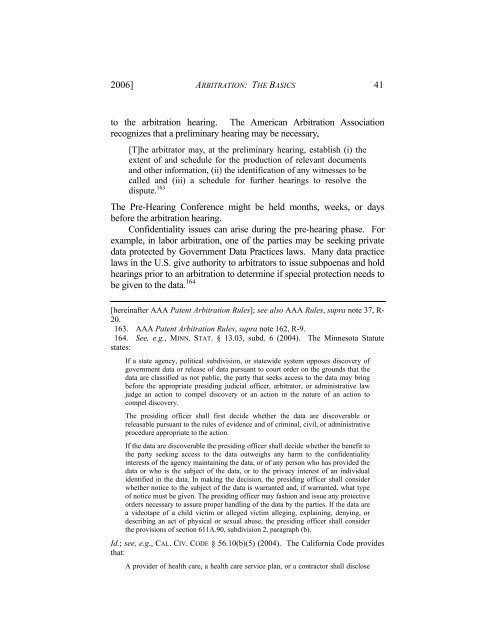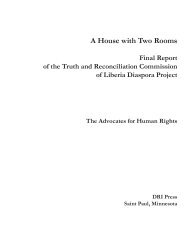2006/Vol. 5 No.1 - Hamline Law - Hamline University
2006/Vol. 5 No.1 - Hamline Law - Hamline University
2006/Vol. 5 No.1 - Hamline Law - Hamline University
Create successful ePaper yourself
Turn your PDF publications into a flip-book with our unique Google optimized e-Paper software.
<strong>2006</strong>] ARBITRATION: THE BASICS 41<br />
to the arbitration hearing. The American Arbitration Association<br />
recognizes that a preliminary hearing may be necessary,<br />
[T]he arbitrator may, at the preliminary hearing, establish (i) the<br />
extent of and schedule for the production of relevant documents<br />
and other information, (ii) the identification of any witnesses to be<br />
called and (iii) a schedule for further hearings to resolve the<br />
dispute. 163<br />
The Pre-Hearing Conference might be held months, weeks, or days<br />
before the arbitration hearing.<br />
Confidentiality issues can arise during the pre-hearing phase. For<br />
example, in labor arbitration, one of the parties may be seeking private<br />
data protected by Government Data Practices laws. Many data practice<br />
laws in the U.S. give authority to arbitrators to issue subpoenas and hold<br />
hearings prior to an arbitration to determine if special protection needs to<br />
be given to the data. 164<br />
[hereinafter AAA Patent Arbitration Rules]; see also AAA Rules, supra note 37, R-<br />
20.<br />
163. AAA Patent Arbitration Rules, supra note 162, R-9.<br />
164. See, e.g., MINN. STAT. § 13.03, subd. 6 (2004). The Minnesota Statute<br />
states:<br />
If a state agency, political subdivision, or statewide system opposes discovery of<br />
government data or release of data pursuant to court order on the grounds that the<br />
data are classified as not public, the party that seeks access to the data may bring<br />
before the appropriate presiding judicial officer, arbitrator, or administrative law<br />
judge an action to compel discovery or an action in the nature of an action to<br />
compel discovery.<br />
The presiding officer shall first decide whether the data are discoverable or<br />
releasable pursuant to the rules of evidence and of criminal, civil, or administrative<br />
procedure appropriate to the action.<br />
If the data are discoverable the presiding officer shall decide whether the benefit to<br />
the party seeking access to the data outweighs any harm to the confidentiality<br />
interests of the agency maintaining the data, or of any person who has provided the<br />
data or who is the subject of the data, or to the privacy interest of an individual<br />
identified in the data. In making the decision, the presiding officer shall consider<br />
whether notice to the subject of the data is warranted and, if warranted, what type<br />
of notice must be given. The presiding officer may fashion and issue any protective<br />
orders necessary to assure proper handling of the data by the parties. If the data are<br />
a videotape of a child victim or alleged victim alleging, explaining, denying, or<br />
describing an act of physical or sexual abuse, the presiding officer shall consider<br />
the provisions of section 611A.90, subdivision 2, paragraph (b).<br />
Id.; see, e.g., CAL. CIV. CODE § 56.10(b)(5) (2004). The California Code provides<br />
that:<br />
A provider of health care, a health care service plan, or a contractor shall disclose
















